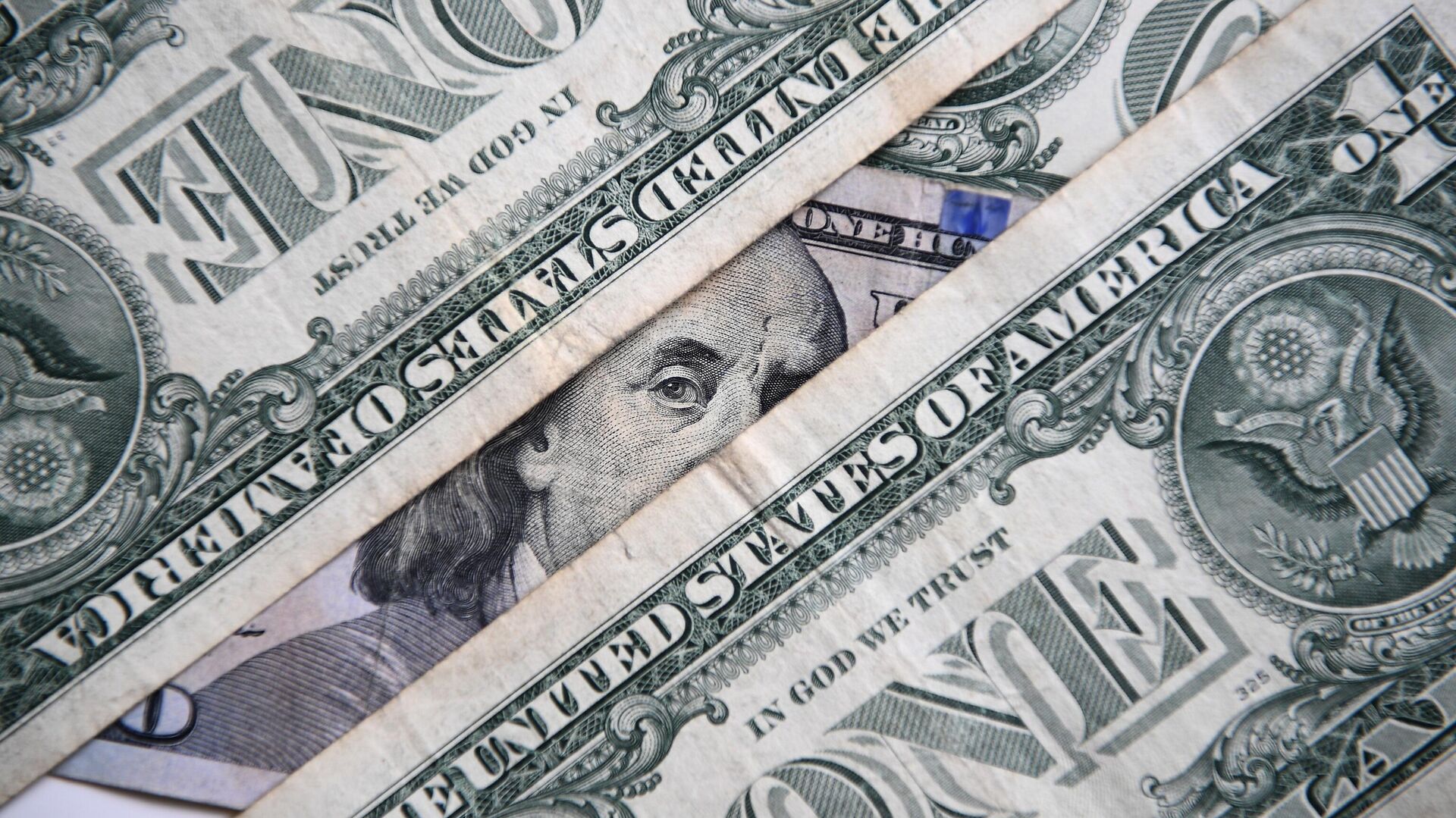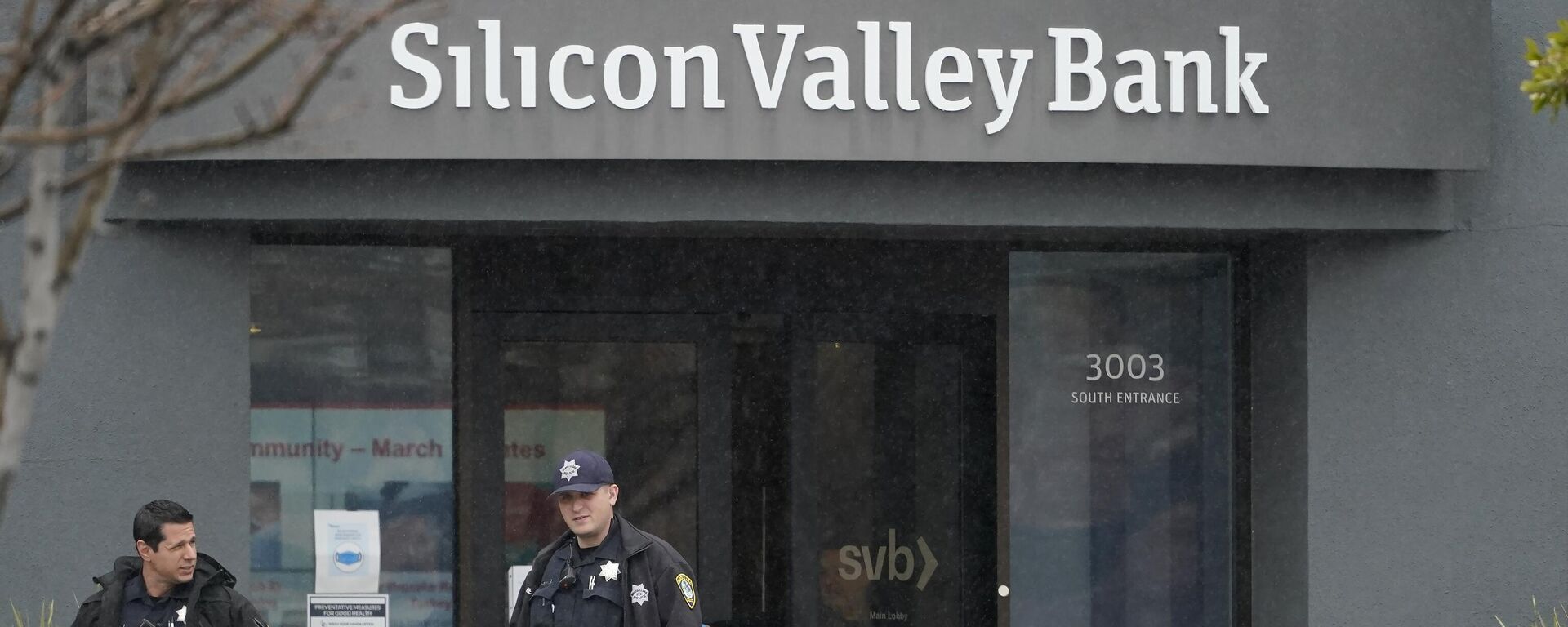https://sputnikglobe.com/20230504/debt-ceiling-battle-and-federal-reserve-interest-hikes-could-wreck-us-economy-1110096898.html
Debt Ceiling Battle and Federal Reserve Interest Hikes Could Wreck US Economy
Debt Ceiling Battle and Federal Reserve Interest Hikes Could Wreck US Economy
Sputnik International
While the US Federal Reserve struggles to contain inflation, banks are failing and the government faces a debt default. Steve Hayes and Dr. Jack Rasmus see even bigger problems looming ahead.
2023-05-04T18:41+0000
2023-05-04T18:41+0000
2023-05-04T18:41+0000
americas
us
jack rasmus
us treasury
debt ceiling
silicon valley bank collapse
financial crisis
us financial crisis
us federal reserve bank
interest rates
https://cdn1.img.sputnikglobe.com/img/07e6/08/0f/1099623349_0:161:3071:1888_1920x0_80_0_0_a52b2252236220ed82364d4ace1f254a.jpg
The US faces a combination of unaffordable interest rates, unbridled inflation and economic recession just as government spending is about to hit the buffers, two experts say.Dr Jack Rasmus told Sputnik that the US was heading for a rude awakening as attempts to control inflation fail."All those economists have said that the Fed strategy and course of action would lead to a soft landing and all of them they change their tune and they say 'Oh, well, it's going to be a recession'," Rasmus said. "And of course, they're saying it'll be a mild one until there's not."The Fed's hiking of interest rates in an attempt to reduce demand and bring don inflation will not even work, the economist argued.Fed chairman Jerome Powell has openly stated that his interest rate policy will mean job losses."His target is to provoke in the services sector more layoffs that would reduce income and therefore reduce demand," Rasmus said. "So he's been targeting the services sector, which is 80% of the economy" — but which is still growing "rather robustly."Furthermore, hiking interest rates is what caused the collapse of Silicon Valley and other banks, slashing the value of their portfolios of Treasury bonds issued when the rate was lower.Another crisis looms as the US Treasury approaches the limit of its $1.1 trillion debt ceiling — as Republicans and Democrats in Congress argue over what conditions should be attached to raising the government's borrowing limit to $1.5 billion.Republican House Speaker Kevin McCarthy's debt bill passed the lower house of Congress but may face stiffer resistance from Democrats in the Senate.Steve Hayes told Sputnik that McCarthy was "probably closer to President Biden's opinion than anybody would think" and was "doing most of this because he has to."The tax attorney said there were conservatives who "sincerely believe" that government deficit is rising "too fast" and will severely damage the economy.But other Republicans were "not against spending spending money on things they believe in, but they're against increasing the debt," Hayes said, while "on the other side, you've got a lot of people who sincerely agree with what's called the modern economic theory, which says that deficits don't matter."If the Treasury really does go off a "cliff edge", the immediate effects could be cuts in welfare and medical benefits, procurement from private contractors or even laying off federal employees. Those could have a series of negative knock-on effects for the economy.To read what else our top commentators think, visit our Telegram channel.For more in-depth analysis of current affairs, check out our Sputnik Radio shows.
https://sputnikglobe.com/20230504/trading-halted-in-shares-of-western-alliance-latest-us-bank-in-trouble-after-pacwest-1110096945.html
americas
Sputnik International
feedback@sputniknews.com
+74956456601
MIA „Rossiya Segodnya“
2023
James Tweedie
https://cdn1.img.sputnikglobe.com/img/07e4/08/1c/1080307270_0:3:397:400_100x100_80_0_0_7777393b9b18802f2e3c5eaa9cbcc612.png
James Tweedie
https://cdn1.img.sputnikglobe.com/img/07e4/08/1c/1080307270_0:3:397:400_100x100_80_0_0_7777393b9b18802f2e3c5eaa9cbcc612.png
News
en_EN
Sputnik International
feedback@sputniknews.com
+74956456601
MIA „Rossiya Segodnya“
Sputnik International
feedback@sputniknews.com
+74956456601
MIA „Rossiya Segodnya“
James Tweedie
https://cdn1.img.sputnikglobe.com/img/07e4/08/1c/1080307270_0:3:397:400_100x100_80_0_0_7777393b9b18802f2e3c5eaa9cbcc612.png
us, federal reserve, treasury, debt ceiling, kevin mccarthy, jack rasmus, steve hayes, interest rates, inflation, recession, economy
us, federal reserve, treasury, debt ceiling, kevin mccarthy, jack rasmus, steve hayes, interest rates, inflation, recession, economy
Debt Ceiling Battle and Federal Reserve Interest Hikes Could Wreck US Economy
While the US Federal Reserve struggles to contain inflation, banks are failing and the government faces a debt default. Steve Hayes, tax attorney and chairman of FairTax, and economist, radio show host and author Dr. Jack Rasmus see even bigger problems looming ahead.
The US faces a combination of unaffordable interest rates, unbridled inflation and economic recession just as government spending is about to hit the buffers, two experts say.
Dr Jack Rasmus told
Sputnik that the US was heading for a rude awakening as attempts to control inflation fail.
"All those economists have said that the Fed strategy and course of action would lead to a soft landing and all of them they change their tune and they say 'Oh, well, it's going to be a recession'," Rasmus said. "And of course, they're saying it'll be a mild one until there's not."
The Fed's hiking of interest rates in an attempt to reduce demand and bring don inflation will not even work, the economist argued.
"Most of inflation, the majority of is due to supply side forces and the Fed can't do anything about supply side, it admits that," Rasmus said.
Fed chairman Jerome Powell has openly stated that his interest rate policy will mean job losses.
"His target is to provoke in the services sector more layoffs that would reduce income and therefore reduce demand," Rasmus said. "So he's been targeting the services sector, which is 80% of the economy" — but which is still growing "rather robustly."
Furthermore, hiking interest rates is what caused the collapse of Silicon Valley and other
banks, slashing the value of their portfolios of Treasury bonds issued when the rate was lower.
"If you raise rates any further, you're going to exacerbate the banking crisis in the regional banks, which is already happening" Rasmus pointed out. "So he's between a rock and a hard place. Monetary policy is broken. If he raises, he makes the the problem worse."
Another crisis looms as the
US Treasury approaches the limit of its $1.1 trillion debt ceiling — as Republicans and Democrats in Congress argue over what conditions should be attached to raising the government's borrowing limit to $1.5 billion.
Republican House Speaker Kevin McCarthy's debt bill passed the lower house of Congress but may face stiffer resistance from Democrats in the Senate.
Steve Hayes told Sputnik that McCarthy was "probably closer to
President Biden's opinion than anybody would think" and was "doing most of this because he has to."
The tax attorney said there were conservatives who "sincerely believe" that government deficit is rising "too fast" and will severely damage the economy.
But other Republicans were "not against spending spending money on things they believe in, but they're against increasing the debt," Hayes said, while "on the other side, you've got a lot of people who sincerely agree with what's called the modern economic theory, which says that deficits don't matter."
If the Treasury really does go off a "cliff edge", the immediate effects could be cuts in welfare and medical benefits, procurement from private contractors or even laying off federal employees. Those could have a series of negative knock-on effects for the economy.
"People who don't get paid don't spend money. They don't pay other people who are relying on them to pay them," Hayes stressed. "From an economic point of view, you're going to have a lot of panic. You're going to have a lot of people get laid off because... you're going to have a lot of people unwilling to purchase because they're scared" that they won't be able to service loans on big-ticket items like new cars. "And so you're going to see a spiralling effect all across."
To read what else our top commentators think, visit our Telegram channel. For more in-depth analysis of current affairs, check out our Sputnik Radio shows. 



